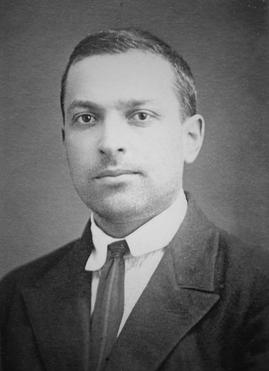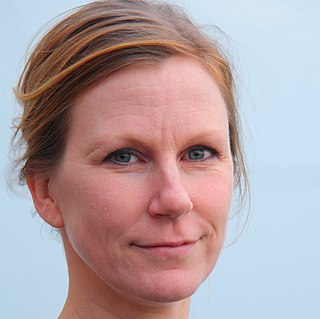Related Research Articles

Developmental psychology is the scientific study of how and why humans grow, change, and adapt across the course of their lives. Originally concerned with infants and children, the field has expanded to include adolescence, adult development, aging, and the entire lifespan. Developmental psychologists aim to explain how thinking, feeling, and behaviors change throughout life. This field examines change across three major dimensions, which are physical development, cognitive development, and social emotional development. Within these three dimensions are a broad range of topics including motor skills, executive functions, moral understanding, language acquisition, social change, personality, emotional development, self-concept, and identity formation.

Lev Semyonovich Vygotsky was a Russian and Soviet psychologist, best known for his work on psychological development in children and creating the framework known as cultural-historical activity theory. After his early death, his books and research were banned in the Soviet Union until Joseph Stalin's death in 1953, with a first collection of major texts published in 1956.
Lawrence Kohlberg was an American psychologist best known for his theory of stages of moral development.
Humanistic psychology is a psychological perspective that arose in the mid-20th century in answer to two theories: Sigmund Freud's psychoanalytic theory and B. F. Skinner's behaviorism. Thus, Abraham Maslow established the need for a "third force" in psychology. The school of thought of humanistic psychology gained traction due to Maslow in the 1950s.
Personality development encompasses the dynamic construction and deconstruction of integrative characteristics that distinguish an individual in terms of interpersonal behavioral traits. Personality development is ever-changing and subject to contextual factors and life-altering experiences. Personality development is also dimensional in description and subjective in nature. That is, personality development can be seen as a continuum varying in degrees of intensity and change. It is subjective in nature because its conceptualization is rooted in social norms of expected behavior, self-expression, and personal growth. The dominant viewpoint in personality psychology indicates that personality emerges early and continues to develop across one's lifespan. Adult personality traits are believed to have a basis in infant temperament, meaning that individual differences in disposition and behavior appear early in life, potentially before language of conscious self-representation develop. The Five Factor Model of personality maps onto the dimensions of childhood temperament. This suggests that individual differences in levels of the corresponding personality traits are present from young ages.
Paul B. Baltes was a German psychologist whose broad scientific agenda was devoted to establishing and promoting the life-span orientation of human development. He was also a theorist in the field of the psychology of aging. He has been described by American Psychologist as one of the most influential developmental psychologists.
Organismic theories in psychology are a family of holistic psychological theories which tend to stress the organization, unity, and integration of human beings expressed through each individual's inherent growth or developmental tendency. The idea of an explicitly "organismic theory" dates at least back to the publication of Kurt Goldstein's The organism: A holistic approach to biology derived from pathological data in man in 1934. Organismic theories and the "organic" metaphor were inspired by organicist approaches in biology. The most direct influence from inside psychology comes from Gestalt psychology. This approach is often contrasted with mechanistic and reductionist perspectives in psychology.
Occupational health psychology (OHP) is an interdisciplinary area of psychology that is concerned with the health and safety of workers. OHP addresses a number of major topic areas including the impact of occupational stressors on physical and mental health, the impact of involuntary unemployment on physical and mental health, work-family balance, workplace violence and other forms of mistreatment, psychosocial workplace factors that affect accident risk and safety, and interventions designed to improve and/or protect worker health. Although OHP emerged from two distinct disciplines within applied psychology, namely, health psychology and industrial and organizational psychology, for a long time the psychology establishment, including leaders of industrial/organizational psychology, rarely dealt with occupational stress and employee health, creating a need for the emergence of OHP. OHP has also been informed by other disciplines, including occupational medicine, sociology, industrial engineering, and economics, as well as preventive medicine and public health. OHP is thus concerned with the relationship of psychosocial workplace factors to the development, maintenance, and promotion of workers' health and that of their families. The World Health Organization and the International Labour Organization estimate that exposure to long working hours causes an estimated 745,000 workers to die from ischemic heart disease and stroke in 2016, mediated by occupational stress.
Some of the research that is conducted in the field of psychology is more "fundamental" than the research conducted in the applied psychological disciplines, and does not necessarily have a direct application. The subdisciplines within psychology that can be thought to reflect a basic-science orientation include biological psychology, cognitive psychology, neuropsychology, and so on. Research in these subdisciplines is characterized by methodological rigor. The concern of psychology as a basic science is in understanding the laws and processes that underlie behavior, cognition, and emotion. Psychology as a basic science provides a foundation for applied psychology. Applied psychology, by contrast, involves the application of psychological principles and theories yielded up by the basic psychological sciences; these applications are aimed at overcoming problems or promoting well-being in areas such as mental and physical health and education.

Andreas Demetriou is a Greek Cypriot developmental psychologist and former Minister of Education and Culture of Cyprus. He is a founding fellow and president of The Cyprus Academy of Sciences, Letters and Arts.
Psychology encompasses a vast domain, and includes many different approaches to the study of mental processes and behavior. Below are the major areas of inquiry that taken together constitute psychology. A comprehensive list of the sub-fields and areas within psychology can be found at the list of psychology topics and list of psychology disciplines.

Mark Stemmler, was Professor of Psychological Methodology and Quality Assurance at the Faculty of Psychology and Sports Science, Bielefeld University from 2007 to 2011. He was also a member of the Center for Statistics at Bielefeld University. Currently he is Professor of Psychological Assessment at the Department of Psychology and Sports Science at the University of Erlangen-Nuremberg. Since 2010 he is also adjunct professor at the College of Health and Human Development at the Pennsylvania State University.

The Börje Langefors Award is an annual academic prize awarded since 2011 by the Swedish Information Systems Academy for the best doctoral dissertation in Sweden in the subject areas - informatics, information systems, data and information science or equivalent. The prize aims to reward and encourage development of high standard research in Sweden, and to demonstrate exemplary research in informatics.
M. Brent Donnellan is a professor of psychology at Michigan State University. He is known for research on social psychology and personality psychology.
Arnold J. Sameroff is an American developmental psychologist. He researches and writes about developmental theory and the factors that contribute to mental health and psychopathology, especially related to risk and resilience. Together with Michael Chandler he is known for developing the transactional model of development. He is one of the founders of the field of developmental psychopathology.
Per-Olof Helge Wikstrӧm is Professor of Ecological and Developmental Criminology at the University of Cambridge, Professorial Fellow of Girton College and Principal Investigator of the Peterborough Adolescent and Young Adult Development Study (PADS+), a major ESRC funded longitudinal study of young people in the UK which aims to advance knowledge about crime causation and prevention. His main research interests are developing a unified theory of the causes of crime, testing it empirically and applying it to devising knowledge-based prevention policies. His work is internationally acknowledged, as demonstrated by his election as a Fellow of the American Society of Criminology in 2010 and a Fellow of the British Academy in 2011.
Patrick James Curran is an American psychologist and statistician. He is a professor of quantitative psychology at the University of North Carolina, where he is also a faculty member at the Center for Developmental Science.
Daniel John Bauer is an American statistician, professor, and director of the quantitative psychology program at the University of North Carolina, where he is also on the faculty at the Center for Developmental Science. He is known for rigorous methodological work on latent variable models and is a proponent of integrative data analysis, a meta-analytic technique that pools raw data across multiple independent studies.
Relational developmental systems (RDS) is a developmental psychological metatheory and conceptual framework. It is an extension of developmental systems theory that is based on the view that relationism is a superior alternative to Cartesian mechanism. RDS is the leading framework in modern developmental science. According to RDS metatheory, interactions between individuals and their environments, rather than either entity acting separately, are the cause of all aspects of human development. The term "relational developmental systems paradigm" has been used to refer to the combination of the RDS metatheory and the relationist worldview. The RDS framework is also fundamentally distinct from that of quantitative behavioral genetics, in that the former focuses on the causes of individual development, while the latter focuses on individual differences. RDS theorists reject the dichotomies associated with Cartesian dualism, such as those between nature and nurture, and between basic and applied science.

Ellen Louise "E.L." Hamaker is a Dutch-American psychologist, and statistician. Since 2018 she has been a full professor at Utrecht University, holding the chair Longitudinal Data Analysis at the Department of Methodology and Statistics. Her work focuses on the development of statistical models for the analysis of intensive longitudinal data in psychology, mainly within the frameworks of structural equation modeling and time series analysis.
References
- ↑ Obituary in Svenska Dagbladet 16 September 2017 (p. 53).
- ↑ Magnusson, D. (1999). Holistic interactionism: A perspective for research on personality development. In L. Pervin & O. John (Eds.), Handbook of personality (pp. 219–247). New York: Guilford
- ↑ Magnusson, D. (2000). Individual development: Toward a developmental science. Proceedings of the American Philosophical Society, 143, 86–96.
- ↑ Bergman, L. R. & Lundh, L. G. (2015). Introduction: The person-oriented approach: Roots and roads to the future. Journal for Person-Oriented Research, 1, 1–6. doi:10.17 505/jpor.2015.01
- ↑ Magnusson, D. (1988). Individual development from an interactional perspective: A longitudinal study. Hillsdale, NJ, England: Lawrence Erlbaum Associates, Inc.
- ↑ Bergman, L. R., & Lundh, L. G. (2018). In memoriam: David Magnusson 1925–2017. Journal for Person-Oriented Research, 3(2), 65–66. https://doi.org/10.17505/jpor.2017.06
- ↑ Bergman, L. R., Andershed, A.-K., Meehan, A., & Andershed, H. (2018). Individual development and adaptation (IDA): A lifespan longitudinal program suited for person-oriented research. Journal for Person-Oriented Research, 4(2), 63–77. doi: 10.17505/jpor.2018.07